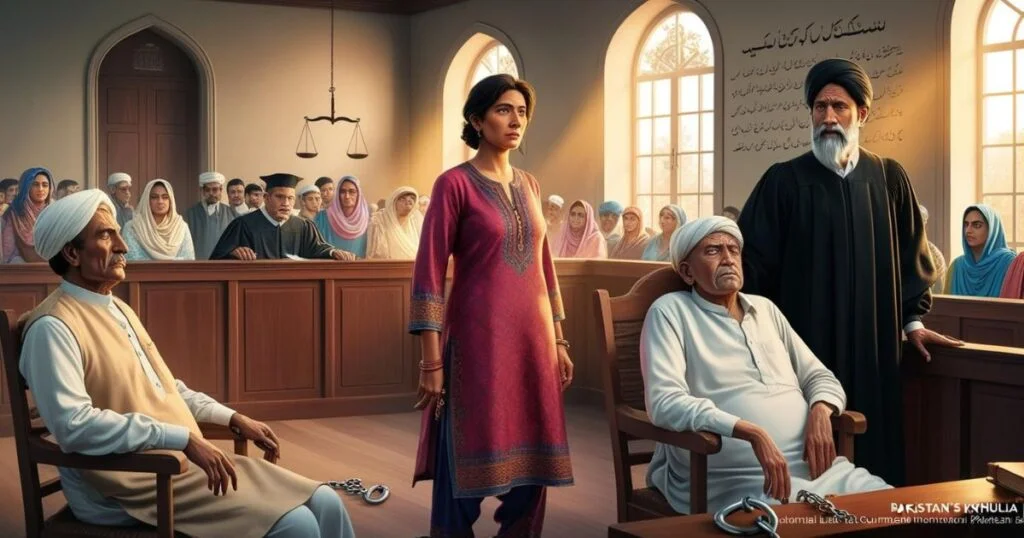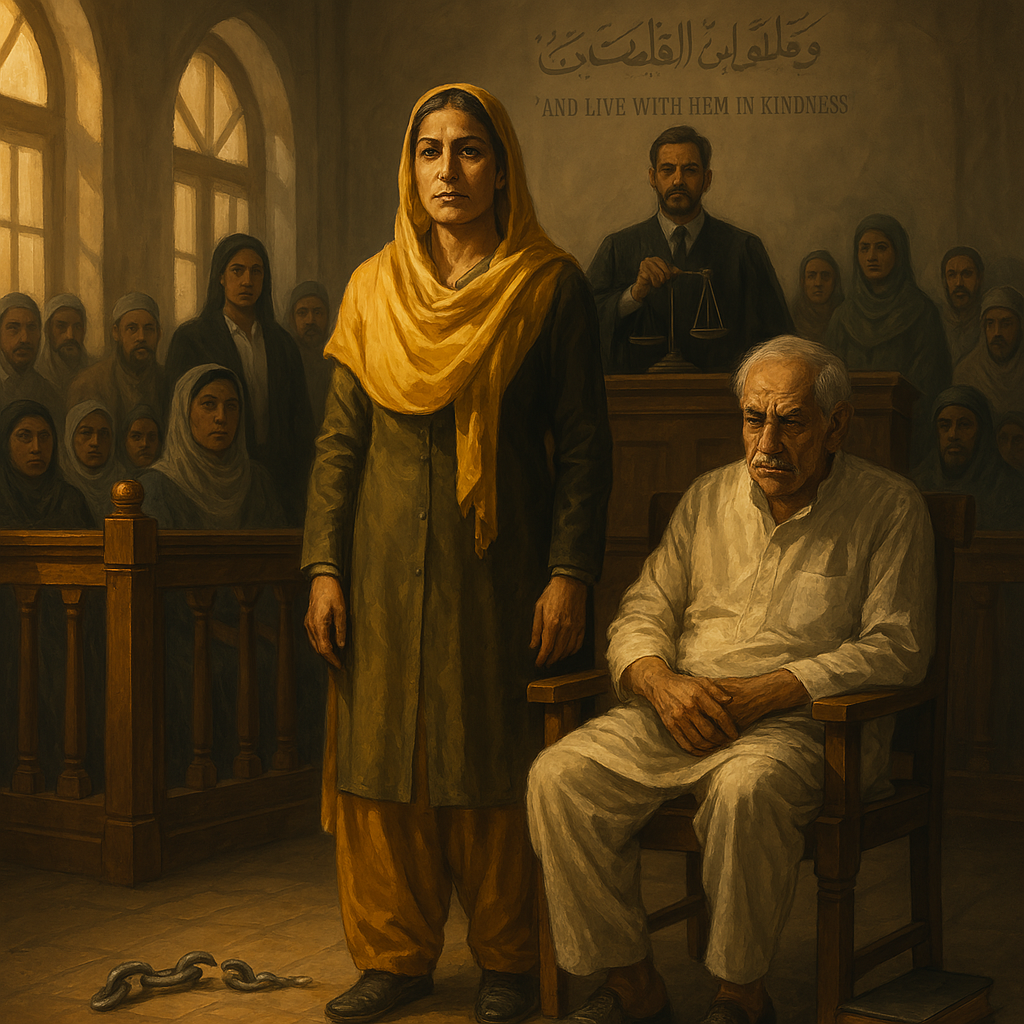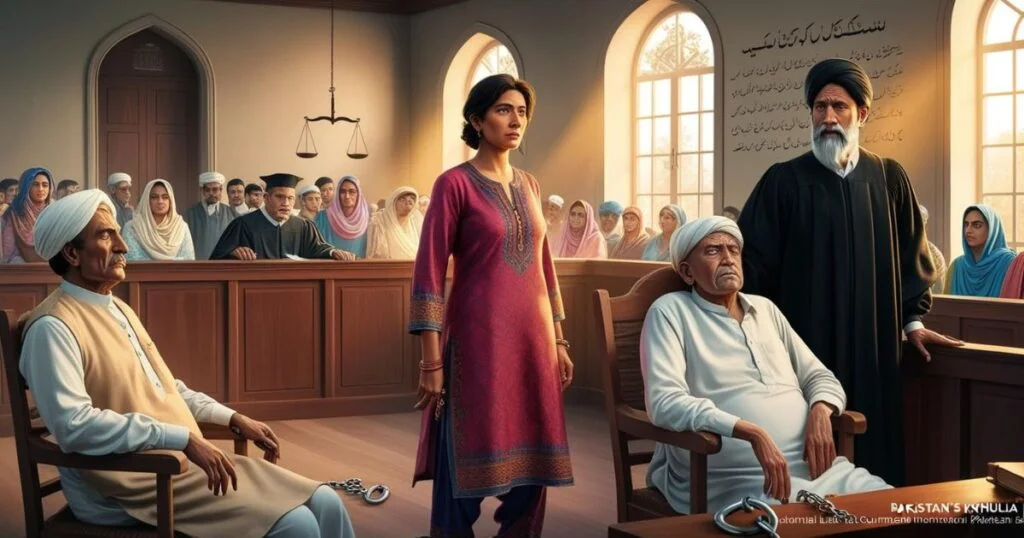The Journey of Right and Justice in a Khula Case – A Story of Courage, Law, and Empowerment
خُلع کیس میں حق اور انصاف کا سفر – ہمت، قانون اور بااختیاری کی کہانی
Understanding Khula in Pakistani Society: A Legal and Emotional Lifeline
In Pakistan, Khula cases are more than legal battles—they are deeply personal journeys intertwined with Islamic law, societal norms, and marital rights. The recent Supreme Court decision dismissing Abdullah and Ms. Abida’s Khula case has ignited conversations about justice, age disparities, and emotional aversion in marriages. This blog dives into the case’s intricacies, blending legal analysis with human emotion to inspire every citizen to fight for their rights in court.
پاکستانی معاشرے میں خُلع کی سمجھ: ایک قانونی اور جذباتی زندگی بھر کا سفر
پاکستان میں خُلع کے کیس صرف قانونی جنگ نہیں ہیں – یہ اسلامی قوانین، معاشرتی روایات اور ازدواجی حقوق سے جڑے گہرے ذاتی سفر ہیں۔ حال ہی میں سپریم کورٹ کے فیصلے نے عبداللہ اور محترمہ عابدہ کے خُلع کیس کو خارج کر کے انصاف، عمر کے فرق اور ازدواجی ناچاقیوں پر بحث چھیڑ دی ہے۔ یہ بلاگ اس کیس کی پیچیدگیوں کو قانونی تجزیے اور انسانی جذبات کے امتزاج سے پیش کرتا ہے، تاکہ ہر شہری کو عدالت میں اپنے حقوق کی جنگ کے لیے ابھارا جا سکے۔

| عدالتی فیصلہ پر اردو بلاگ | |||||
| عدالتی فیصلے کا حوالہ نمبر | 1998SCMR954 | Dissolution Of Marriage, Khula خلع، تنسیخ نکاح | |||
| کس عدالت نے کیس سنا | سپریم کورٹ آف پاکستان | ||||
| جن جسٹس صاحبان نے کیس سنا | اجمل میاں اور فضل الہی خان | ||||
| جوابی درخواست گزاران | درخواست گزاران | ||||
| مس عابدہ اور ایک اور — مدعا علیہان | بنام | عبداللہ — درخواست گزار | |||
| فیصلہ لکھنے والا جسٹس | اجمل میاں | ||||
The Khula Case Background: Age, Emotion, and Marital Strife
Abdullah, a man in his late 70s, married Ms. Abida, a 40-year-old woman, in a union marked by a stark age difference. Over time, Ms. Abida experienced profound emotional aversion, claiming her marriage lacked peace and mutual respect—a critical foundation under Islamic law. Her decision to file for Khula in the Family Court stemmed from unbearable emotional distress, setting the stage for a landmark legal precedent.
For readers unfamiliar, Khula allows a Muslim woman to dissolve her marriage by returning her dowry (mahr) if she proves irreconcilable differences. Unlike divorce (talaq), Khula requires judicial intervention, making the Family Court a pivotal arena for justice.
خُلع کیس کی بنیاد: عمر، جذبات اور ازدواجی کشمکش
عبداللہ، جو 70 کی دہائی میں تھا، نے 40 سالہ عابدہ سے شادی کی جس میں عمر کا بہت بڑا فرق تھا۔ وقت گزرنے کے ساتھ، عابدہ نے گہری جذباتی ناچاقی محسوس کی اور دعویٰ کیا کہ ان کی شادی میں اسلامی قانون کے تحت ضروری امن اور باہمی احترام مفقود تھا۔ خاندانی عدالت میں خُلع کا کیس دائر کرنے کا فیصلہ ان کی جذباتی اذیت کا نتیجہ تھا، جو ایک اہم قانونی مثال بن گیا۔
خُلع ایک مسلمان عورت کو یہ حق دیتا ہے کہ وہ مہر واپس کر کے شادی ختم کر سکے، بشرطیکہ وہ ناقابلِ اصلاح اختلافات ثابت کر دے۔ طلاق (تَلاق) کے برعکس، خُلع کے لیے عدالتی مداخلت ضروری ہوتی ہے، جو خاندانی عدالت کو انصاف کا اہم محور بنا دیتی ہے۔
Arguments in the Family Court: Clash of Legal Perspectives
Abdullah’s Lawyer: Challenging Emotional Aversion as Grounds for Khula
Mr. Muhammad Nawaz Abbasi, Abdullah’s lawyer, argued that the Family Court erred in granting Khula based solely on Ms. Abida’s emotional aversion. Under Islamic law, he contended, Khula requires substantial evidence of harm or failure to fulfill marital duties—not just subjective feelings.
“Courts must scrutinize whether the petitioner genuinely cannot live ‘within Allah’s limits’ with her spouse,” Abbasi asserted. He emphasized that emotional aversion alone isn’t grounds for Khula, urging the court to demand concrete proof of abuse or neglect.
Ms. Abida’s Lawyer: Defending the Right to Emotional Freedom
Ms. Abida’s legal team countered that Islamic law prioritizes mutual respect and compassion. Citing Quranic principles, they argued that forcing a woman to remain in a loveless marriage violates her dignity. “When a woman’s heart is devoid of love or respect, Khula becomes her sacred right,” her lawyer stated.
The age difference and lifestyle incompatibility were highlighted as catalysts for Ms. Abida’s suffering. Her testimony—that she felt “no connection” to Abdullah—was framed as a valid emotional and psychological burden under Pakistani family law.
خاندانی عدالت میں دلائل: قانونی نقطہ نظر کا تصادم
عبداللہ کے وکیل: جذباتی ناچاقی کو خُلع کی بنیاد چیلنج کرنا
عبداللہ کے وکیل محمد نواز عباسی نے کہا کہ خاندانی عدالت نے صرف جذباتی ناچاقی کی بنیاد پر خُلع دینے میں غلطی کی۔ ان کا مؤقف تھا کہ اسلامی قانون کے تحت خُلع کے لیے ضروری ہے کہ ظلم یا ازدواجی فرائض کی ناکامی کے ٹھوس ثبوت پیش کیے جائیں – محض ذاتی جذبات کافی نہیں۔
انہوں نے زور دے کر کہا: “عدالتوں کو یہ جانچنا چاہیے کہ آیا خاتون واقعی ‘اللہ کی حدود’ میں رہنے سے قاصر ہے۔” ان کا کہنا تھا کہ جذباتی ناچاقی اکیلے خُلع کی وجہ نہیں بن سکتی۔
محترمہ عابدہ کے وکیل: جذباتی آزادی کے حق کا دفاع
عابدہ کے قانونی ٹیم نے کہا کہ اسلامی قانون باہمی احترام اور ہمدردی کو ترجیح دیتا ہے۔ قرآن کی روشنی میں، انہوں نے دلیل دی کہ کسی عورت کو بے محبت شادی میں رہنے پر مجبور کرنا اس کی عزتِ نفس کے خلاف ہے۔ “جب عورت کا دل محبت یا احترام سے خالی ہو، تو خُلع اس کا مقدس حق بن جاتا ہے۔
عمر کے فرق اور طرزِ زندگی کی غیر مطابقت کو عابدہ کے دکھ کی وجہ بتایا گیا۔ ان کی گواہی – کہ وہ عبداللہ سے “کوئی ربط” محسوس نہیں کرتی تھیں – کو پاکستانی فیملی لا کے تحت جذباتی اور نفسیاتی بوجھ قرار دیا گیا۔

Family Court’s Decision: Validating Emotional Aversion in Khula Cases
The Family Court ruled in Ms. Abida’s favor, dissolving the marriage via Khula. The judge noted that the age gap created irreconcilable differences, and Ms. Abida’s emotional aversion made cohabitation “unbearable and unjust.” This decision underscored the court’s role in addressing societal realities—a theme later upheld by the Supreme Court.
خاندانی عدالت کا فیصلہ: خُلع کیسز میں جذباتی ناچاقی کو تسلیم کرنا
فیملی عدالت نے عابدہ کے حق میں فیصلہ دیا اور عمر کے فرق کو ناقابلِ اصلاح اختلافات کی وجہ قرار دے کر شادی ختم کر دی۔ جج نے کہا کہ عابدہ کی جذباتی حالت رہائش کو “ناگزیر اور ناانصافی” بنا دیتی ہے۔ یہ فیصلہ معاشرتی حقائق کو عدالتی عمل میں شامل کرنے کی مثال تھا، جسے بعد میں سپریم کورٹ نے بھی برقرار رکھا۔
Appeal to the Supreme Court: Upholding Justice and Legal Precedent
Abdullah appealed to the Supreme Court, arguing the Family Court overlooked procedural rigor. However, Justice Ejazul Ahsan affirmed the lower court’s ruling, stressing that emotional aversion is a legitimate factor under Islamic law.
“Courts cannot trivialize a woman’s emotional torment,” Justice Ahsan remarked. He emphasized that Khula cases must balance legal rigor with compassion, acknowledging that forced marriages corrode societal harmony.
سپریم کورٹ میں اپیل: انصاف اور قانونی مثال کو برقرار رکھنا
عبداللہ نے سپریم کورٹ سے اپیل کی، جس میں ان کا کہنا تھا کہ فیملی کورٹ نے طریقہ کار کی سختی کو نظرانداز کیا ہے۔ تاہم، جسٹس اعجاز الاحسن نے زیریں عدالت کے فیصلے کی توثیق کرتے ہوئے زور دیا کہ اسلامی قانون کے تحت جذباتی نفرت ایک جائز عنصر ہے۔
جسٹس اعجاز الاحسن نے کہا، “عدالتیں کسی عورت کے جذباتی کرب کو معمولی نہیں سمجھ سکتیں۔” انہوں نے زور دے کر کہا کہ خلع کے مقدمات میں قانونی سختی کے ساتھ ساتھ ہمدردی کا توازن ضروری ہے، اور یہ تسلیم کیا کہ جبری شادیاں معاشرتی ہم آہنگی کو خراب کرتی ہیں۔
Key Legal Precedent: Emotional Aversion as Grounds for Khula
This case established a legal precedent: emotional aversion, when substantiated, is valid grounds for Khula under Pakistani family law. The judgment clarified that courts must weigh societal realities—like age differences and lifestyle clashes—alongside Islamic principles.
For citizens, this precedent is empowering. It signals that courts recognize emotional well-being as integral to marital rights, urging individuals to seek justice without fear.
اہم قانونی مثال: خُلع کی بنیاد کے طور پر جذباتی ناچاقی
اس مقدمے نے ایک قانونی مثال قائم کی: جذباتی نفرت، جب ثابت ہو جائے، پاکستانی فیملی لا کے تحت خلع کی جائز بنیاد ہے۔ فیصلے میں واضح کیا گیا کہ عدالتوں کو اسلامی اصولوں کے ساتھ ساتھ معاشرتی حقائق—جیسے عمر کا فرق اور طرزِ زندگی کے تصادم—کو بھی مدنظر رکھنا چاہیے۔
شہریوں کے لیے، یہ مثال بااختیار بنانے والی ہے۔ یہ اشارہ دیتی ہے کہ عدالتیں جذباتی بہبود کو ازدواجی حقوق کا لازمی حصہ سمجھتی ہیں، اور لوگوں کو بلا خوف انصاف کی تلاش کی ترغیب دیتی ہیں۔
Why This Khula Case Matters for Every Pakistani
Emotional Well-Being vs. Societal Pressure
Many Pakistani women endure unhappy marriages due to stigma around divorce. This Supreme Court decision challenges that norm, affirming that emotional health is a legal priority.
Age Difference and Marital Compatibility
The case highlights how age disparities can exacerbate marital discord. Courts are now more likely to consider such factors in Khula cases, offering hope to those in similar plights.
Legal Empowerment Through Knowledge
Understanding one’s rights under Islamic law and the Family Court system is crucial. This case educates citizens on using legal channels to reclaim autonomy.
یہ خُلع کیس ہر پاکستانی کے لیے کیوں اہم ہے؟
جذباتی صحت بمقابلہ معاشرتی دباؤ: بہت سی خواتین طلاق کے بدنامی کے ڈر سے ناخوشگوار شادیاں برداشت کرتی ہیں۔ یہ فیصلہ اس روایت کو چیلنج کرتا ہے۔
عمر کا فرق اور ازدواجی ہم آہنگی: عمر کا فرق کشمکش کو بڑھا سکتا ہے۔ عدالتیں اب ایسے عوامل کو خُلع کیسز میں شامل کر رہی ہیں۔
علم کے ذریعے قانونی بااختیاری: اسلامی قانون اور خاندانی عدالت کے نظام کو سمجھنا ضروری ہے۔
How to Pursue Khula: A Step-by-Step Guide for Citizens
- File a Petition: Submit a Khula application to your local Family Court, detailing grounds like cruelty, neglect, or emotional aversion.
- Present Evidence: Provide testimonies, witness accounts, or psychological evaluations to support your case.
- Court Mediation: Courts often mediate reconciliation first. If unsuccessful, proceedings advance.
- Judgment: If the court grants Khula, you forfeit the mahr but gain freedom from the marriage.
خُلع حاصل کرنے کا طریقہ کار: شہریوں کے لیے مرحلہ وار رہنمائی
درخواست دائر کریں: فیملی عدالت میں خُلع کی درخواست جمع کروائیں۔
ثبوت پیش کریں: گواہیاں، نفسیاتی رپورٹس، یا دستاویزات پیش کریں۔
ثالثی: عدالت صلح کی کوشش کرے گی۔ ناکامی پر کیس آگے بڑھے گا۔
فیصلہ: خُلع ملنے پر مہر معاف ہو گا، لیکن آپ شادی سے آزاد ہو جائیں گی۔
Stirring the Conscience: Why You Must Fight for Your Rights
Ms. Abida’s victory is a clarion call. Her courage to confront societal norms and demand justice under Islamic law mirrors the resilience every citizen must harness. If you face emotional or physical abuse, remember: the Supreme Court has affirmed your right to dignity.
Imagine this: A life shackled by unhappiness versus the freedom to rebuild. Which would you choose? The law now supports the latter.
ضمیر کو جگانے والا پیغام: اپنے حقوق کیوں لڑنا ضروری ہے؟
مسز عابدہ کی کامیابی ایک واضح پیغام ہے۔ اسلامی قانون کے تحت انصاف کی جدوجہد کرتے ہوئے معاشرتی روایات کا مقابلہ کرنے کی ان کی ہمت ہر شہری کے لیے ایک مثال ہے۔ اگر آپ جذباتی یا جسمانی تشدد کا شکار ہیں، تو یاد رکھیں سپریم کورٹ نے آپ کے وقار کے حق کو تسلیم کر لیا ہے۔
ذرا سوچیں: زنجیروں میں جکڑی ایک غیرخوشگوار زندگی یا ازسرِنو شروع کرنے کی آزادی — آپ کون سا راستہ اختیار کریں گے؟ اب قانون آپ کے حق میں ہے۔
Conclusion: From Courtrooms to Hearts – The Ripple Effect of Justice
Abdullah and Ms. Abida’s Khula case is more than a legal text—it’s a narrative of empowerment. It teaches us that emotional aversion is not a weakness but a valid cry for justice. The Supreme Court’s decision reinforces that Pakistani family law evolves with society, prioritizing human dignity over rigid traditions.
To every reader: Let this story ignite a fire. If your marriage suffocates your spirit, remember Ms. Abida. Walk into the Family Court with your head high, for the law is your ally. Justice isn’t just a verdict—it’s your right.
اختتامیہ: عدالتوں سے دلوں تک – انصاف کی لہر
عبداللہ اور عابدہ کا کیس صرف قانونی متن نہیں – یہ بااختیاری کی داستان ہے۔ سپریم کورٹ کا فیصلہ بتاتا ہے کہ پاکستانی فیملی لا معاشرے کے ساتھ بدل رہا ہے۔
ہر قاری کے نام: اس کہانی سے ایک چنگاری پیدا کریں۔ اگر آپ کی شادی آپ کے جذبے کو گھٹا رہی ہے، تو عابدہ کو یاد کریں۔ سر اونچا کر کے خاندانی عدالت میں داخل ہوں – کیونکہ قانون آپ کا ساتھی ہے۔ انصاف صرف فیصلہ نہیں، یہ آپ کا حق ہے۔


